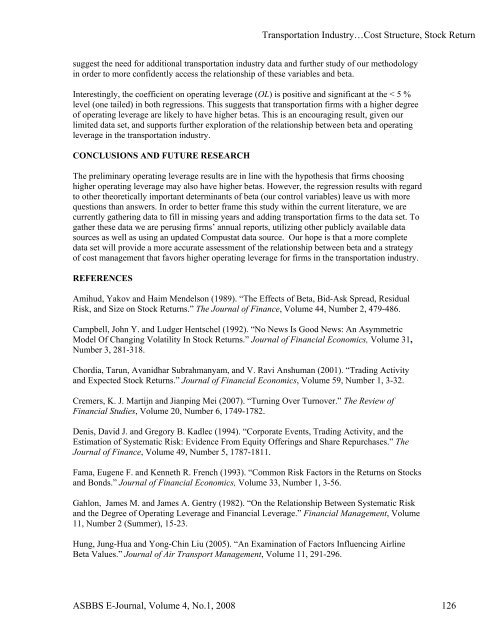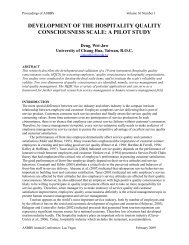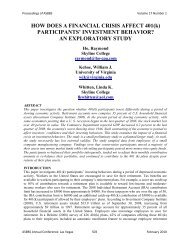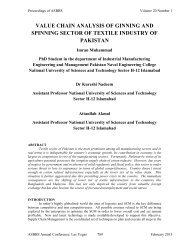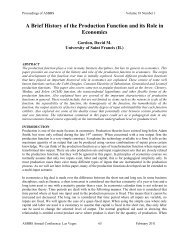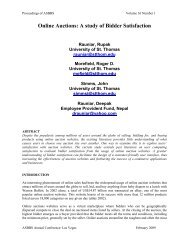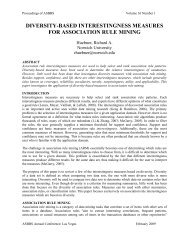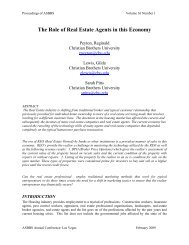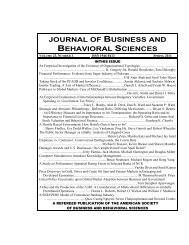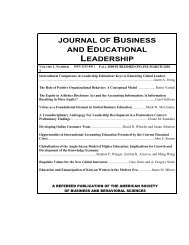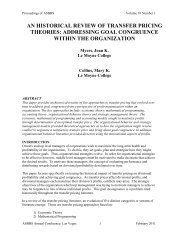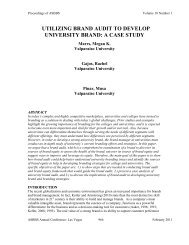stock repurchase announcements: a test of market ... - Asbbs.org
stock repurchase announcements: a test of market ... - Asbbs.org
stock repurchase announcements: a test of market ... - Asbbs.org
You also want an ePaper? Increase the reach of your titles
YUMPU automatically turns print PDFs into web optimized ePapers that Google loves.
Transportation Industry…Cost Structure, Stock Return<br />
suggest the need for additional transportation industry data and further study <strong>of</strong> our methodology<br />
in order to more confidently access the relationship <strong>of</strong> these variables and beta.<br />
Interestingly, the coefficient on operating leverage (OL) is positive and significant at the < 5 %<br />
level (one tailed) in both regressions. This suggests that transportation firms with a higher degree<br />
<strong>of</strong> operating leverage are likely to have higher betas. This is an encouraging result, given our<br />
limited data set, and supports further exploration <strong>of</strong> the relationship between beta and operating<br />
leverage in the transportation industry.<br />
CONCLUSIONS AND FUTURE RESEARCH<br />
The preliminary operating leverage results are in line with the hypothesis that firms choosing<br />
higher operating leverage may also have higher betas. However, the regression results with regard<br />
to other theoretically important determinants <strong>of</strong> beta (our control variables) leave us with more<br />
questions than answers. In order to better frame this study within the current literature, we are<br />
currently gathering data to fill in missing years and adding transportation firms to the data set. To<br />
gather these data we are perusing firms’ annual reports, utilizing other publicly available data<br />
sources as well as using an updated Compustat data source. Our hope is that a more complete<br />
data set will provide a more accurate assessment <strong>of</strong> the relationship between beta and a strategy<br />
<strong>of</strong> cost management that favors higher operating leverage for firms in the transportation industry.<br />
REFERENCES<br />
Amihud, Yakov and Haim Mendelson (1989). “The Effects <strong>of</strong> Beta, Bid-Ask Spread, Residual<br />
Risk, and Size on Stock Returns.” The Journal <strong>of</strong> Finance, Volume 44, Number 2, 479-486.<br />
Campbell, John Y. and Ludger Hentschel (1992). “No News Is Good News: An Asymmetric<br />
Model Of Changing Volatility In Stock Returns.” Journal <strong>of</strong> Financial Economics, Volume 31,<br />
Number 3, 281-318.<br />
Chordia, Tarun, Avanidhar Subrahmanyam, and V. Ravi Anshuman (2001). “Trading Activity<br />
and Expected Stock Returns.” Journal <strong>of</strong> Financial Economics, Volume 59, Number 1, 3-32.<br />
Cremers, K. J. Martijn and Jianping Mei (2007). “Turning Over Turnover.” The Review <strong>of</strong><br />
Financial Studies, Volume 20, Number 6, 1749-1782.<br />
Denis, David J. and Gregory B. Kadlec (1994). “Corporate Events, Trading Activity, and the<br />
Estimation <strong>of</strong> Systematic Risk: Evidence From Equity Offerings and Share Repurchases.” The<br />
Journal <strong>of</strong> Finance, Volume 49, Number 5, 1787-1811.<br />
Fama, Eugene F. and Kenneth R. French (1993). “Common Risk Factors in the Returns on Stocks<br />
and Bonds.” Journal <strong>of</strong> Financial Economics, Volume 33, Number 1, 3-56.<br />
Gahlon, James M. and James A. Gentry (1982). “On the Relationship Between Systematic Risk<br />
and the Degree <strong>of</strong> Operating Leverage and Financial Leverage.” Financial Management, Volume<br />
11, Number 2 (Summer), 15-23.<br />
Hung, Jung-Hua and Yong-Chin Liu (2005). “An Examination <strong>of</strong> Factors Influencing Airline<br />
Beta Values.” Journal <strong>of</strong> Air Transport Management, Volume 11, 291-296.<br />
ASBBS E-Journal, Volume 4, No.1, 2008 126


